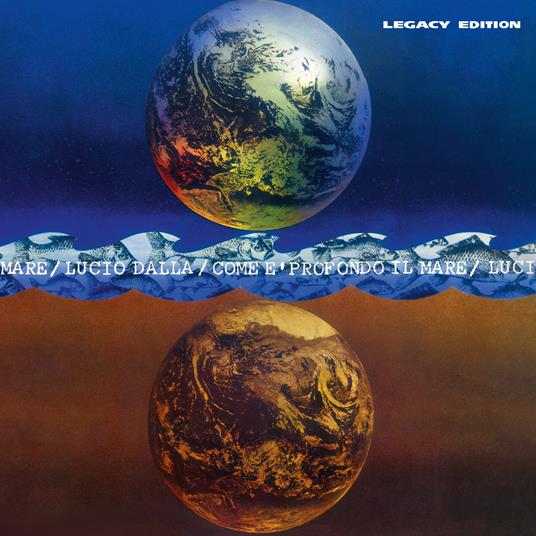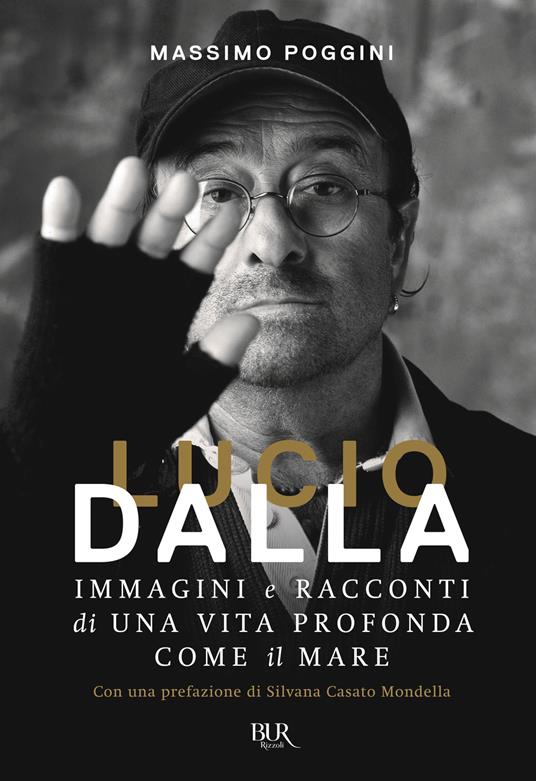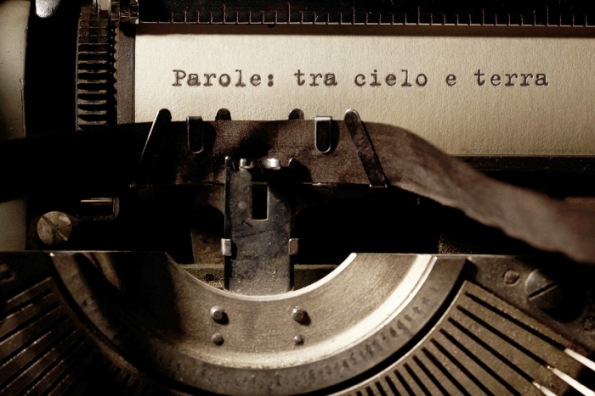“Lucio Dalla. Images and stories of a life as deep as the sea “by Massimo Poggini (Rizzoli)
* * *
by Helena Molinari
The most beautiful and intense book by the journalist Massimo Poggini, there is no doubt.
A book that goes far beyond mere biography or musical anecdotal.
A book that borders on fiction.
A book that not only evokes, but in doing so knows how to excite.
A book that tells of that wonderful little man who was and is Lucio Dalla, gestures and soul, the white lie and the crucifix.
A book that makes you want, even to those who know little or nothing about him, to listen and listen again.
Here is the interview with the author.
– “Work sanctifies…” Life sanctifies… Lucio Dalla, man and songwriter, amalgam of earth and sky?
Lucio was deeply religious. He always has been, but over the years he became more and more. He went to mass every Sunday, he was a friend of the Dominican friars of Bologna and of the minor friars of Assisi. He said that a part of one of his most famous songs of him, “The year to come”, he had written in the parlor of the San Domenico convent in Bologna. He performed in front of two popes and even set the Psalms to music. In his songs he often mentions God or Jesus Christ (sometimes understood in the more human meaning of “poor Christ”). However, while always behaving with the utmost respect, he had no awe, even going so far as to scold the God of Christians: in “If I were an angel” he accuses him of making a mistake when he forgives those “rascals of the powerful”.
He spoke about religion and spirituality several times. This statement sums up what his idea was: “I have an unorthodox relationship with religion. For example, I go to mass regularly, but in reality I am fascinated above all by its theatricality. When I pray I am very informal, but when I get to work I have a little mantra that helps me find the right rhythm, almost in the Buddhist way, to ask God that my work can be useful to someone. However, there is a feeling that I carry with me in a very natural, not ideological way, and that is that in every man I feel I see Jesus ”.
– What do you think is the passage in this sense that best grasps this incredibly earthly yet spiritual being of his?
I would say “Le rondini”, the text of which was read in tears by Marco Alemanno during Lucio’s funeral. It is one of his most delicate and poetic songs by him. That text Dalla had written “in a melancholy April afternoon” in 1990 on a bench that he himself had placed in Rancitella, a hamlet of Urbino, where he had purchased an old isolated tower on a small hill, which he had transformed into dwelling. Lucio had chosen the swallows as a symbol of simplicity and lightness: by transforming himself into one of them, he could observe life from different angles, questioning himself on happiness and pain, and perhaps being able to understand their real meaning.
– Which Lucio’s record would you play in full to today’s kids. Why and how would you introduce it in case?
Difficult to choose just one, Lucio has recorded several masterpieces. Really extraordinary, for example, the trilogy made in the “grace period” 1977-1980 (“How deep is the sea”, “Dalla” and “Lucio Dalla”). But the three albums he wrote together with the poet Roberto Roversi must also be rediscovered and enhanced. Another record that he deserved more is “Henna” (1993).  However, if I really have to say only one, I choose “How deep is the sea”. A bit because it is the first that Lucio made entirely by himself, music and lyrics. A little ‘because, in addition to containing all excellent songs (“Sail train”, “The puppy Alfredo”, “Corso Buenos Aires”, “Desperate erotic stomp”, “What joy”, “… and never go away”, “Barcarola”), opens with that absolute masterpiece which is the title track. A piece that musically was absolutely out of any dominant scheme in that period, but above all it is characterized by a text that in my opinion should be disseminated in schools because it is a real history lesson concentrated in a series of fulminating verses. It is a sort of historical excursus of man. After a mention of the fish “from which we all descend”, Lucio speaks of the class struggle (“It is useless there is no more work / There is no more decorum”). While in the following stanzas he tells of the October Revolution in Russia, World War II, concentration camps and Hiroshima. So there is that ending which is a mighty hymn to ecology ante litteram: “This is how the sea is burning / This is how the sea is being killed”.
However, if I really have to say only one, I choose “How deep is the sea”. A bit because it is the first that Lucio made entirely by himself, music and lyrics. A little ‘because, in addition to containing all excellent songs (“Sail train”, “The puppy Alfredo”, “Corso Buenos Aires”, “Desperate erotic stomp”, “What joy”, “… and never go away”, “Barcarola”), opens with that absolute masterpiece which is the title track. A piece that musically was absolutely out of any dominant scheme in that period, but above all it is characterized by a text that in my opinion should be disseminated in schools because it is a real history lesson concentrated in a series of fulminating verses. It is a sort of historical excursus of man. After a mention of the fish “from which we all descend”, Lucio speaks of the class struggle (“It is useless there is no more work / There is no more decorum”). While in the following stanzas he tells of the October Revolution in Russia, World War II, concentration camps and Hiroshima. So there is that ending which is a mighty hymn to ecology ante litteram: “This is how the sea is burning / This is how the sea is being killed”.
* * *
The book’s description: “Lucio Dalla. Images and stories of a life as deep as the sea “by Massimo Poggini (BUR Rizzoli)
 “I am inconsistent. I really like being one and I like people who are. I live in the daily expectation of changes. The meeting tomorrow, if there will be, the discovery of a new place, the uncertainty of the next hour: this is my world ”(Lucio Dalla). On the occasion of the ten years since the death of the great artist, author of unforgettable pages in the history of Italian music, this illustrated book tells the life of Lucio Dalla like a fairy tale, through many of his most curious and interesting testimonies and a multitude of photographs, which retrace his musical and private adventure. From childhood to the relationship with mother Iole, from the first approaches to the stage to the passion for jazz, from the dawn of a not exactly sparkling career to the early Sanremo, gradually towards the sixties and seventies and the crucial encounters with some of his friends and most trusted collaborators, from the great passion for the sea, Naples and Bologna to his deep spirituality, intertwined with a farcical and playful soul: Massimo Poggini, long-time music journalist, gives us the fresco of a brilliant Dalla as few, eccentric and surprising, without forgetting his immortal songs, of which he reveals the creative background and the most hidden meanings. The author of the preface is Silvana Casato Mondella, who for thirty-five years was the press office and close friend of the Bolognese artist.
“I am inconsistent. I really like being one and I like people who are. I live in the daily expectation of changes. The meeting tomorrow, if there will be, the discovery of a new place, the uncertainty of the next hour: this is my world ”(Lucio Dalla). On the occasion of the ten years since the death of the great artist, author of unforgettable pages in the history of Italian music, this illustrated book tells the life of Lucio Dalla like a fairy tale, through many of his most curious and interesting testimonies and a multitude of photographs, which retrace his musical and private adventure. From childhood to the relationship with mother Iole, from the first approaches to the stage to the passion for jazz, from the dawn of a not exactly sparkling career to the early Sanremo, gradually towards the sixties and seventies and the crucial encounters with some of his friends and most trusted collaborators, from the great passion for the sea, Naples and Bologna to his deep spirituality, intertwined with a farcical and playful soul: Massimo Poggini, long-time music journalist, gives us the fresco of a brilliant Dalla as few, eccentric and surprising, without forgetting his immortal songs, of which he reveals the creative background and the most hidden meanings. The author of the preface is Silvana Casato Mondella, who for thirty-five years was the press office and close friend of the Bolognese artist.
* * *
Massimo Poggini, born in San Giustino (PG) in 1955, is a thoroughbred music journalist. He worked for twenty-eight years in the editorial office of “Max”. For Rizzoli, he published Vasco. A reckless life (2008), Liga. The biography (2009), Pooh. Our breathless years (2009) and, with Maurizio Solieri, Rock ‘n’ roll Tonight (2010).
* * *

* * *
All the episodes of “Words: between heaven and earth” are available here
* * *
© Literature – www.letteratitudine.it
LiteratureBlog / LiteratureNews / Literature Radio / LiteratureVideo
LUCIO DALLA. Images and stories of a life as deep as the sea
